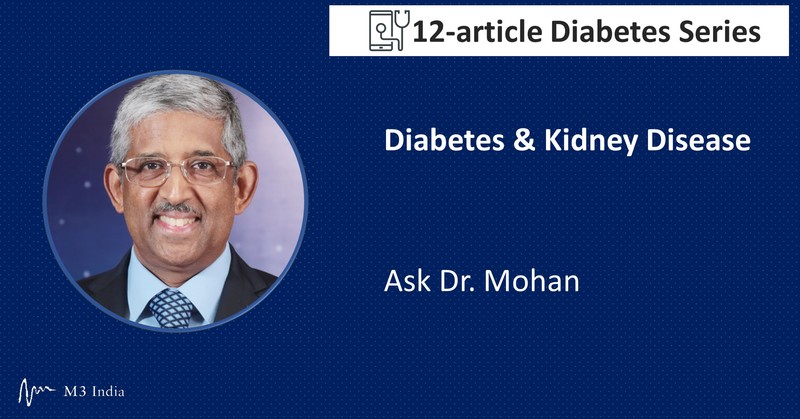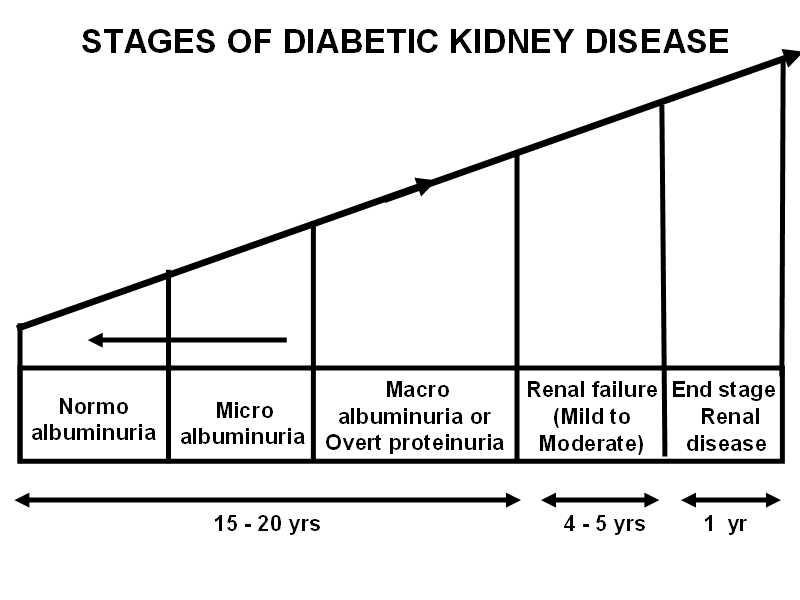Exclusive- Diabetes and kidney disease: Ask Dr. V Mohan
M3 India Newsdesk Feb 06, 2020
Dr. V Mohan in his exclusive series on Diabetes, writes on the disease and associated complications that may lead to kidney disease in patients, also focusing on stages of progression and preventive measures that doctors can advise.

Diabetes has now become a global epidemic. There are an estimated 450 million people with diabetes worldwide, of whom, almost 40% live in India and China alone. In India, there are an estimated 72 million people with diabetes and these numbers are expected to increase to 134 million in the next 10 to 15 years. Uncontrolled diabetes can affect many organs and the effect on the kidneys are one of the most serious of all complications of diabetes. .
After 15 to 20 years of diabetes, nearly a third of people develop kidney complications. Indeed, diabetes mellitus is the most common cause of chronic kidney disease and kidney failure in the world and almost 40% of all diagnosis and transplants are done in people with diabetes. Therefore, it is essential that clinicians treating people with diabetes understand how to appropriately screen patients for diabetic kidney disease so that they may implement an appropriate treatment strategy that is focused on the prevention of kidney diseases and if is already present, to try to slow down its progression.
Stages of diabetic kidney disease
This first stage of diabetic kidney disease (DKD) is called microalbuminuria. The kidney's filtration function usually remains normal during this period. However, small amounts of albumin begin to leak into the urine. As the disease progresses, larger quantities of albumin leak into the urine. This stage is called macroalbuminuria or proteinuria.
Slowly the kidneys' filtering capacity usually begins to drop and the body begins to retain various waste products as filtration falls. As kidney damage develops further, the blood pressure rises and this further damages the kidney. After months or years, the DKD may progress to end stage renal disease (ESRD), which requires a person to have a kidney transplant or regular dialysis. Figure 1 shows the stages of diabetic kidney disease.

What can be done to prevent diabetic kidney disease (DKD)?
Blood glucose control: The most important factor is good control of diabetes. If the diabetes is detected early and treated aggressively, it is possible to prevent diabetic kidney disease in most patients. One must aim to keep the glycated haemoglobin (HbA1c) below 7% at all times. This will virtually eliminate the risk of developing DKD.
Blood pressure control: It is equally important to keep the blood pressure (BP) also under control if DKD is to be prevented. It is ideal to keep the BP less than 130/80 mmHg or even at 120/70 mmHg, if there is already some evidence of kidney involvement.
Blood lipids: There is some evidence that controlling the serum cholesterol and triglyceride levels may also help to prevent diabetic kidney disease.
Avoiding nephrotoxic agents: It is important to avoid medicines that can affect the kidney e.g. pain killers like NSAID drugs and certain antibiotics. Contrast dyes used for doing CT Scans can also affect the kidney.
One should also treat any urinary or bladder or kidney infections aggressively. Finally, the patient should be advised to drink enough water and keep themselves well hydrated. Kidney stones or urinary strictures or prostate enlargement can also lead to kidney damage in the future if left untreated and these must be promptly treated.
Dietary factors in the prevention and control of diabetic kidney disease
It is possible to prevent or delay health problems from chronic kidney disease (CKD), by eating the right foods and avoiding foods high in sodium, potassium, and phosphorus.
- Protein foods such as meat and dairy products break down into waste products that healthy kidneys remove from the blood. When one takes too much protein, ie. far more than the body needs, one may put an extra burden on the kidneys and cause kidney function to decline faster.
- Those with high blood pressure should be advised to limit their daily sodium intake to no more than 1,500 mg. Choosing sodium-free or low-sodium food products will help. Alternative seasonings such as lemon juice, salt-free seasoning mixes and hot pepper sauce can help people reduce their salt intake.
- Frequent monitoring of serum, potassium levels is essential. Too low or too high potassium levels can be a problem. Potassium keeps the heart beating regularly and the muscles working properly. When kidneys are damaged, potassium builds up in the blood and may cause serious heart problems. Potassium is found in many fruits and vegetables and hence if instructed by the dietitian, these may have to be curtailed.
- People with advanced chronic kidney disease may need to limit their fluid (water) intake because damaged kidneys can’t remove the extra fluid. The fluid can thus build up in the body and strain the heart. Hence the amount of fluid permitted by the doctor must be adhered to prevent diabetic kidney disease.
Other lifestyle modification for diabetes with kidney disease
Lifestyle modifications should be initiated to control the progression of kidney disease.
- Physical activity- helps to use the insulin in the body. Maintaining an ideal body weight helps to maintain blood glucose levels, and losing weight to achieve the ideal body weight benefits blood sugar levels.
- Quitting smoking and using tobacco in any form is essential to prevent all complications of diabetes. Smoking increases the risk for many associated illness, and can also increase the risk of kidney failure.
- Patients should be advised to consult with experts before starting a medication for diabetes kidney disease.
Recommended tests for those with suspected diabetic kidney disease
- Fasting and postprandial plasma glucose levels
- Blood urea
- Serum creatinine
- Estimated Glomerular Filtration Rate (eGFR)
- Serum electrolytes (sodium, potassium and bicarbonate)
- Serum lipids
- Blood pressure
- Renal ultrasound
- ECG
- Others as indicated (e.g. renal vascular study)
To read articles published in the series, click,
Treatment algorithm; factors to consider while prescribing medication: Dr. V Mohan
Diabetes Q&A with Dr. V Mohan: Treatment algorithm for DM
Managing hypertension in diabetic patients: Dr. V Mohan
Diabetes Q&A with Dr. V Mohan: Managing hypertension in diabetic patients
Diet and Diabetes: Dr. V Mohan
Exercise & Diabetes by Dr. V Mohan
Q&A with Dr. V Mohan: Exercise and Diabetes
Being a part of this exclusive series allows you to post a question for Dr. V Mohan. Answers will be published in the next article in this monthly series.
Disclaimer- The views and opinions expressed in this article are those of the author's and do not necessarily reflect the official policy or position of M3 India.
The author, Dr. V Mohan is the Chairman & Chief of Diabetology at Dr. Mohan’s Diabetes Specialities Centre & Madras Diabetes Research Foundation, Chennai, India.
-
Exclusive Write-ups & Webinars by KOLs
-
Daily Quiz by specialty
-
Paid Market Research Surveys
-
Case discussions, News & Journals' summaries